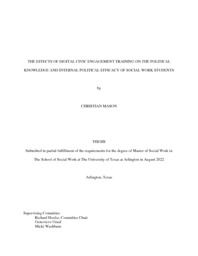
ATTENTION: The works hosted here are being migrated to a new repository that will consolidate resources, improve discoverability, and better show UTA's research impact on the global community. We will update authors as the migration progresses. Please see MavMatrix for more information.
Show simple item record
| dc.contributor.advisor | Hoefer, Richard | |
| dc.creator | Mason, Christian Andrew | |
| dc.date.accessioned | 2022-09-15T13:34:30Z | |
| dc.date.available | 2022-09-15T13:34:30Z | |
| dc.date.created | 2022-08 | |
| dc.date.issued | 2022-08-08 | |
| dc.date.submitted | August 2022 | |
| dc.identifier.uri | http://hdl.handle.net/10106/30960 | |
| dc.description.abstract | It is an ethical obligation for social workers to be civically engaged because the issues central to the profession, like poverty, are public issues. One widely used method to examine civic engagement is the civic voluntarism model developed by Verba et al. (1995). Furthermore, an emerging arena for civic involvement is the digital environment and its potential use as a training ground. This study was a pilot study to determine if a brief training in digital civic engagement for social work students could lead to an increase in the internal political efficacy and political knowledge of social work students. While this study could not determine statical significance because of a small sample, it did find that the top reason for nonengagement was a lack of time and that disabilities and illness might be unexplored hindrances to civic involvement. Future research might consider repeating the study with a sampling plan that follows the academic calendar and with strong incentives. | |
| dc.format.mimetype | application/pdf | |
| dc.language.iso | en_US | |
| dc.subject | Civic engagement | |
| dc.subject | Civic voluntarism | |
| dc.subject | Social work students | |
| dc.title | The effects of digital civic engagement training on the political knowledge and internal political efficacy of social work students | |
| dc.type | Thesis | |
| dc.degree.department | Social Work | |
| dc.degree.name | Master of Social Work | |
| dc.date.updated | 2022-09-15T13:34:30Z | |
| thesis.degree.department | Social Work | |
| thesis.degree.grantor | The University of Texas at Arlington | |
| thesis.degree.level | Masters | |
| thesis.degree.name | Master of Social Work | |
| dc.type.material | text | |
| dc.creator.orcid | 0000-0001-8063-3577 | |
Files in this item
- Name:
- MASON-THESIS-2022.pdf
- Size:
- 577.0Kb
- Format:
- PDF
This item appears in the following Collection(s)
Show simple item record


